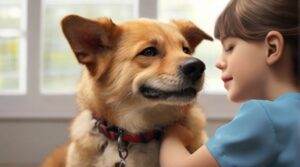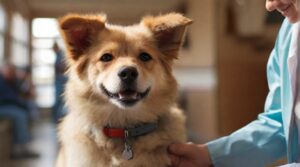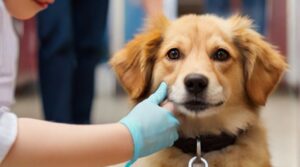Table of Contents
ToggleDog Behavior Change After Vaccination
Let’s explore why Dog Behavior Change After Vaccination.
Introduction
Vaccination is a crucial aspect of responsible pet ownership, helping to protect dogs from various diseases and ensuring their overall health and well-being.
However, it’s not uncommon for pet owners to notice behavioral changes in their dogs following vaccination.
In this article, we’ll explore the relationship between vaccination and dog behavior, understand the signs of behavioral changes, delve into the factors influencing these changes, and discuss effective coping strategies for supporting your furry friend through this period.
Signs of Behavioral Changes

Observing your dog closely after vaccination is essential for detecting any behavioral changes. While some dogs may exhibit no noticeable differences, others may display signs such as lethargy, decreased appetite, or mild discomfort at the injection site.
Additionally, you may observe changes in your dog’s energy levels, temperament, or overall demeanor in the days following vaccination.
Common behavioral changes may include increased restlessness, pacing, whining, or seeking solitude. It’s essential to monitor these changes and provide your dog with the necessary support and reassurance during this time.
Factors Influencing Behavior
Several factors can influence your dog’s behavior following vaccination, including biological and environmental factors. Biological factors may include the dog’s age, health status, and individual response to vaccines.

Young puppies and senior dogs, as well as those with pre-existing health conditions, may be more susceptible to behavioral changes post-vaccination.
Environmental factors, such as stress, anxiety, or previous negative experiences, can also impact your dog’s behavior. Visiting the veterinary clinic, receiving injections, or encountering unfamiliar surroundings may trigger fear or discomfort in some dogs, leading to changes in behavior.
Coping Strategies
Supporting your dog through behavioral changes post-vaccination requires patience, understanding, and compassion.
Providing comfort and reassurance in the form of gentle petting, soothing words, or favorite treats can help alleviate anxiety and promote relaxation. Creating a calm and nurturing environment at home can also contribute to your dog’s overall well-being.

Maintaining a consistent routine and structure is crucial for helping your dog feel safe and secure during this period of adjustment.
Stick to regular mealtimes, exercise routines, and sleep schedules to minimize disruption and provide a sense of stability for your furry companion.
If you notice significant or prolonged changes in your dog’s behavior, it’s essential to seek veterinary advice promptly.
Your veterinarian can assess your dog’s condition, address any underlying health concerns, and recommend appropriate interventions or treatments to alleviate discomfort and support recovery.
Conclusion

In conclusion, behavioral changes in dogs following vaccination are not uncommon and can be attributed to various factors, including biological and environmental influences.
By understanding the signs of behavioral changes, identifying contributing factors, and implementing effective coping strategies, you can support your dog through this transitional period and ensure their continued health and well-being.
FAQs
Here are some FAQs related to
Q: Is it normal for my dog to be lethargic after vaccination?
Yes, it’s not uncommon for dogs to experience lethargy or decreased energy levels following vaccination. This is typically a temporary response to the vaccine and should resolve within a few days. However, if your dog appears excessively lethargic or shows other concerning symptoms, it’s essential to consult your veterinarian for further evaluation.
Q: How can I help my dog feel more comfortable during vaccination?
To help your dog feel more comfortable during vaccination, consider bringing along familiar objects such as a favorite toy or blanket to provide comfort and reassurance. Additionally, offering treats or praise during and after the vaccination can help create positive associations with the experience.
Q: Should I be concerned if my dog’s behavior changes dramatically after vaccination?
While some behavioral changes are normal after vaccination, dramatic or prolonged changes may warrant further investigation. If you notice significant alterations in your dog’s behavior, such as aggression, extreme fear, or persistent lethargy, it’s essential to consult your veterinarian for a thorough evaluation and appropriate management.
Q: How long do behavioral changes typically last after vaccination?
Behavioral changes following vaccination are usually temporary and should resolve within a few days. However, the duration and severity of these changes can vary depending on individual factors such as the dog’s age, health status, and sensitivity to vaccines. If behavioral changes persist or worsen over time, it’s advisable to seek guidance from your veterinarian.
Q: Can vaccination cause aggression in dogs?
While vaccination itself does not directly cause aggression in dogs, some dogs may exhibit increased irritability or defensive behavior due to discomfort or anxiety associated with the vaccination process. It’s essential to provide a calm and supportive environment during vaccination to minimize stress and reduce the likelihood of aggressive responses.
Related Posts :
- Let’s Understand: Why Westies Are the Worst in 2024?
- Let’s Understand Why Schnauzers Are the Worst Dogs in 2024
- Let’s understand Is Pura Safe for Cats?
